“Assessing agreement between kinaesthesis, visual perception and body imagery” is a collaborative study bringing together expertise from BU and AECC.
The project aims to assess whether there are differences in perception and body image between those with chronic low back pain and controls. To do this we are using a variety of measures (outlined below) and it is hoped that the insight we gain from a group of people with chronic pain we can expand the techniques to other populations where body image may become distorted. These include for example those with complex regional pain syndrome, or following an amputation and for those with eating disorders.
The project is being conducted by Dr. Carol Clark, Gill Glasgow (BU) and Dr. Neil Osborne (AECC) along with Dr. Sharon Docherty (AECC) in the AECC Experimental Research Facility. Professors Ahmed Khattab (BU) and Jeff Bagust (AECC & BU) are also involved.
The Kinaesthetic Assessment Bench (KAB)
Lumbar spine kinaesthesis is assessed by using an ultrasound motion analysis system to measure how accurately the subject can reposition their lower body on a motorised bench.
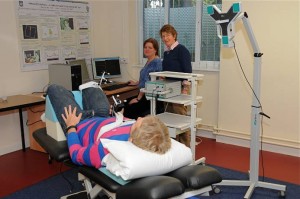
Lower body repositioning
The Computerised Rod and Frame Test (CRAFT)
CRAFT assesses an individual’s perception of vertical using a specialist computerised software system. The test has been employed in studies investigating the perception of vertical in those with acute and chronic neck pain.
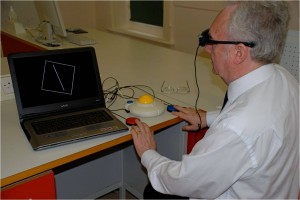
The CRAFT in use
The Body Motor Imagery Test (Recognise TM)
The aim of this test is to assess the activation of cortical networks in relation to body laterality with minimal limb movement. This test employs simple computerised software and has been employed in studies to assess and treat body imagery impairments in those with pain.
The Assessment of Body Image Cognitive Distortions (ABCD)
The ABCD aims to assess cognitive distortions related to body image perception.
Seed corn funding was awarded from HSC in March 2012. This small grant has enabled us:-
– To investigate new concepts in relation to body image and perception
– To record data using the tools in order to establish published results. We are in the process of carrying out the initial data collection
– To develop in-depth knowledge about body image and perception
– To establish contact with researchers at the University of South Australia and Imperial College London.
– To offer two undergraduate research dissertation projects
– To establish interprofessional collaborative working between CC, GG, NO, SD, AK and JB.
– To enable closer collaboration between BU and one of its partner organisations AECC.
For further information please do not hesitate to contact: Carol Clark (HSC), Neil Osborne (AECC) or Sharon Docherty (AECC)
Anyone wishing to take part in the study, please contact Dr Sharon Docherty (SDocherty@aecc.ac.uk) for more details.










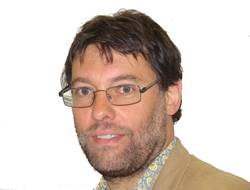



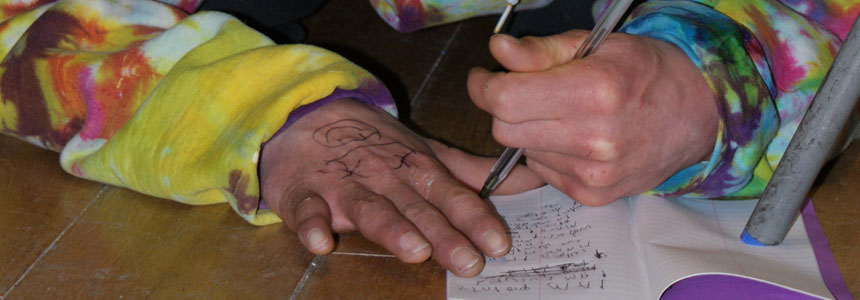


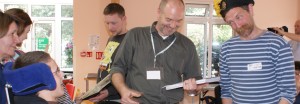
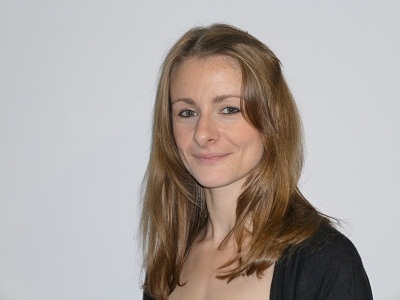

 Professor Ruth Soetendorp, Associate Director of the Centre for Intellectual Property Policy and Management (CIPPM) in the Business School has been quoted in the Financial Times.
Professor Ruth Soetendorp, Associate Director of the Centre for Intellectual Property Policy and Management (CIPPM) in the Business School has been quoted in the Financial Times. 












 Nepal Study Days 2024
Nepal Study Days 2024 We can help promote your public engagement event or activity
We can help promote your public engagement event or activity Funded Public Engagement Opportunity – ESRC Festival of Social Science 2024 -Deadline for Applications Thursday 16 May
Funded Public Engagement Opportunity – ESRC Festival of Social Science 2024 -Deadline for Applications Thursday 16 May 1 WEEK REMAINING- Postgraduate Research Experience Survey (PRES) 2024
1 WEEK REMAINING- Postgraduate Research Experience Survey (PRES) 2024 Conversation article: How 2-Tone brought new ideas about race and culture to young people beyond the inner cities
Conversation article: How 2-Tone brought new ideas about race and culture to young people beyond the inner cities MSCA Postdoctoral Fellowships 2024
MSCA Postdoctoral Fellowships 2024 Horizon Europe News – December 2023
Horizon Europe News – December 2023